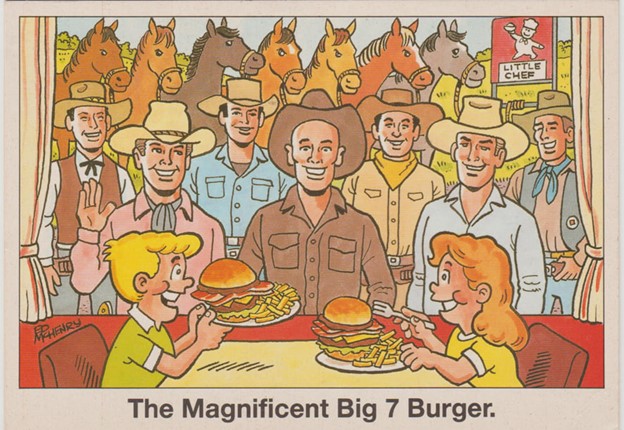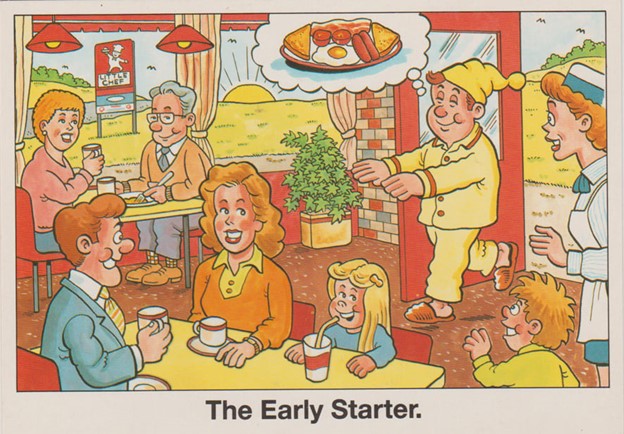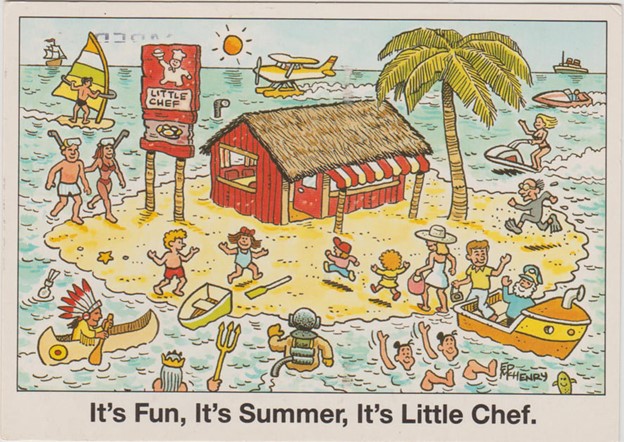John Claydon
Whatever Happened to
Little Chef
It would be a challenge for everyone to find more colorful, vibrant, or feel-good postcards than the sheer joie de vivre of Little Chef’s advertising cards. Even now, with the Little Chef chain of fast-food restaurants an increasingly distant memory, just glancing at the cards gives you a feeling of cheer and wanting to set out on a summer holiday adventure.

It is magical how artist Ed McHenry’s simple designs, immediately transport you away from the drab, humdrum repetitiveness of ordinary life to a new and exciting world. Let’s not worry too much about the quantity of the food or its ingredients, which would no doubt give health bloggers today weeks of copy. Little Chef was all about capitalizing on the fun of the journey and the anticipation of even greater indulgence when you reached your destination.

The success that the Little Chef franchise had is that it brilliantly fulfilled a need at a particular time. From the north to the south of England and from west to east as well, ‘A’ roads [the UK’s equivalent to the USA’s interstates] all had their branch. In Wales there were slightly fewer, and even less in Scotland, but still the main roads boasted plenty. The key thing about Little Chef was that you could decide to stop for a break at the next one, even if you didn’t have a mobile phone to tell you exactly where the next one was. There were also some branches in Northern Ireland and the odd one in Ireland too. At its peak in the 1990s Little Chef had 439 outlets.
It’s sad to read the nonsense of the claim when you look up “Little Chef” on the Internet that there are 70 restaurants from Scotland to Cornwall. The end, apart from the rights to the name, finally came in 2018, but decline set in from the early 2000s and the company went into administration in 2007 and drew in its horns dramatically. There was a flurry of hope in 2009 when the chef Heston Blumenthal brought much publicity through a television series in which he set out to save the company through a complete redesigning of menus and customer service. Only a few restaurants were affected, however, and although the transformation was very positive, especially the music in the loos (!), the overall effect was short-lived.
It’s generally thought that the greater use of motorways by previously regular and potential customers finally marked the death knell of an enterprise founded in 1958 by Sam Alper, whose inspiration had been the bringing of the principle behind US diners to Britain.

Notice the Little Chef sign in a top corner of each card.

The reverse of each card is the same with the slogan “It’s Fun, It’s Summer, It’s LITTLE CHEF.
It sounds like Little Chef was the UK equivalent of the U.S. restaurant chain, Howard Johnson’s. When traveling as a child in the 1960’s, Howard Johnson’s held the contract for the rest stops on the New Jersey, Pennsylvania, and Massachusetts Turnpikes. HoJo’s were strategically placed on other highways as well. When I was a college student in Williamsburg, VA, the local HoJo’s was open 24 hours and had a blueberry pancake special that was great for students studying late.
I wondered why I had never heard of Little Chef until I learned it was not an American chain. Burger Chef and Happy Chef were both around during my youth, although I see the latter name now appears only on the original restaurant in Mankato, Minnesota. The giant chef in the parking lot talked!